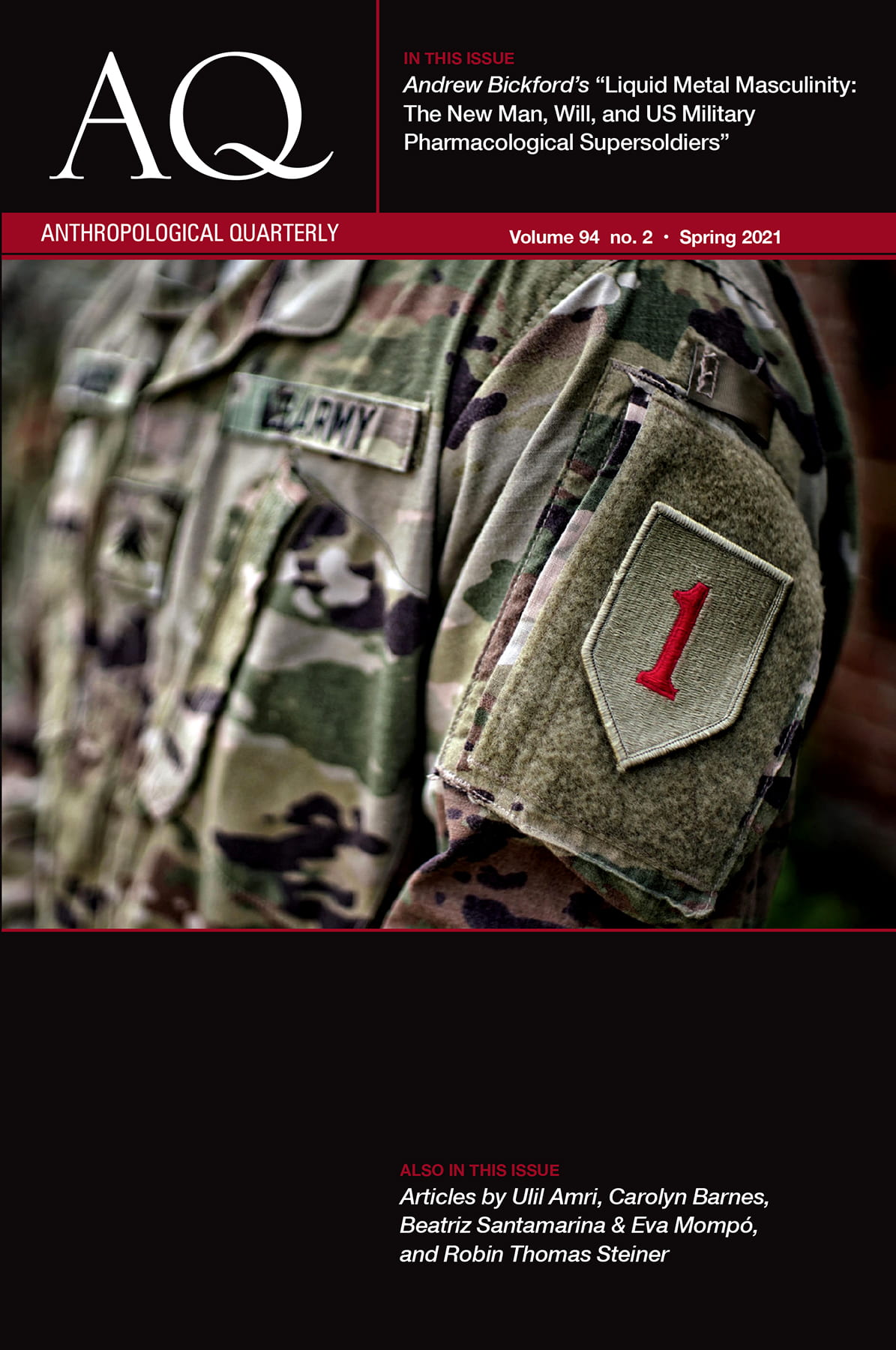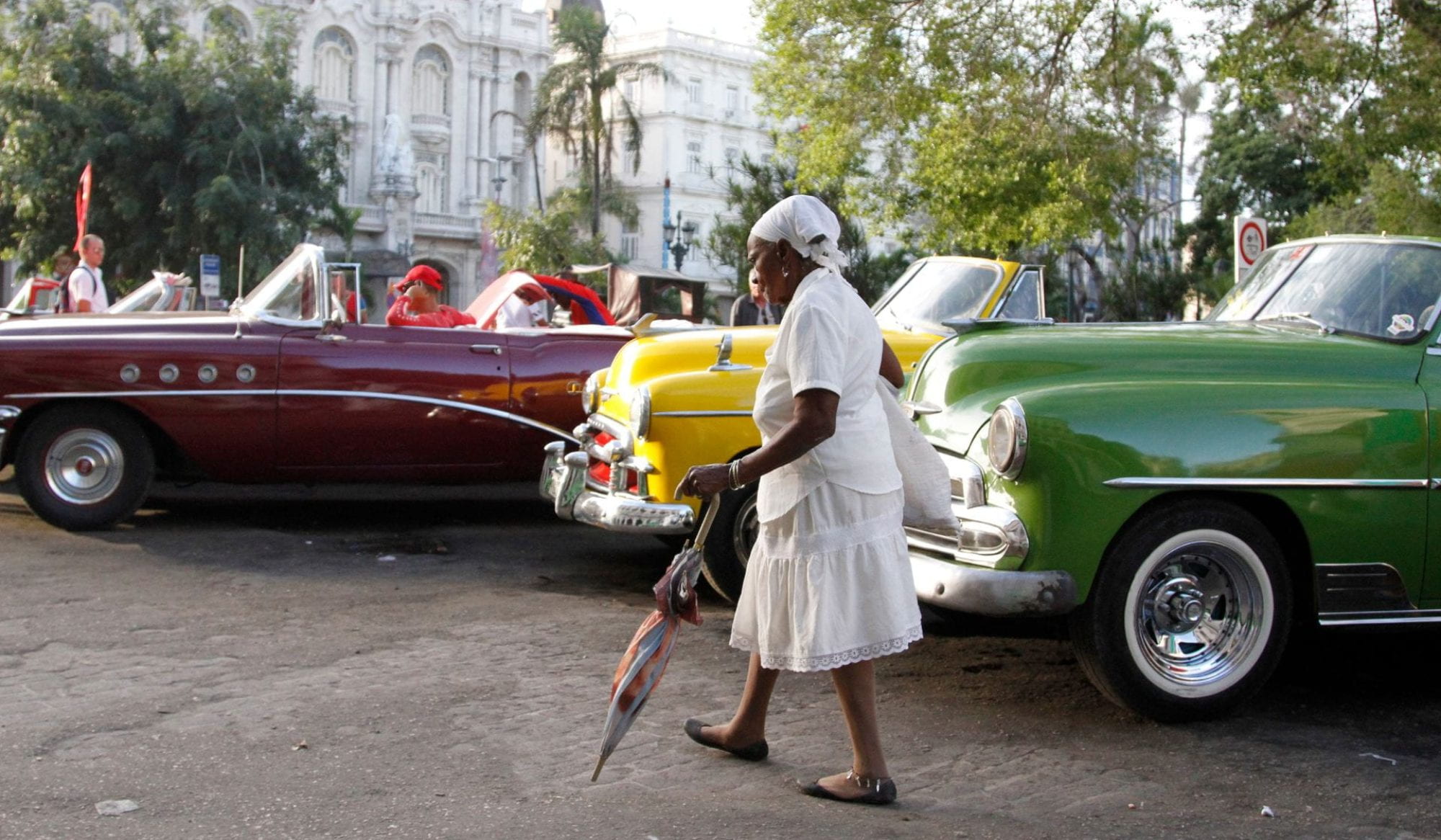TABLE OF CONTENTS

Vol. 94, No. 2
ARTICLES
Andrew Bickford | Liquid Metal Masculinity: The New Man, Will and US Military Pharmacological Supersoldiers
Carolyn Barnes | “Puttin’ Eyes on a Horse”: Horsemanship Attunements and the Merry-go-round of Kentucky’s Thoroughbred Racing Industry
Ulil Amri | Interweaving Piety and Prosperity: Religion, Neoliberalism, and the Environmental Practices in Indonesia
Robin Thomas Steiner | Following His Majesty’s Directives: Corporate Generosity, Social Responsibility, and State Making in Oman
Beatriz Santamarina and Eva Mompó | The Political Opportunity of Heritage: Appropriations, Memories, and Identities in Cabanyal
BOOK REVIEWS
Amelia Frank-Vitale | Lauren Heidbrink’s Migranthood: Youth in a New Era of Deportation
Swee-Lin Ho | Gabriella Lukács’s Invisibility by Design: Women and Labor in Japan’s Digital Economy
Ferhan Güloğlu | Rosalynn A. Vega’s No Alternative: Childbirth, Citizenship, and Indigenous Culture in Mexico
Akiko Takeyama | Gabrielle Koch’s Healing Labor: Japanese Sex Work in the Gendered Economy
Niklas Hultin | Kamari Maxine Clarke’s Affective Justice: The International Criminal Court and the Pan-Africanist Pushback
Katherine A. Mason | Lyle Fearnley’s Virulent Zones: Animal Disease and Global Health at China’s Pandemic Epicenter
Mareike Winchell | Mark Goodale’s A Revolution in Fragments: Traversing Scales of Justice, Ideology, and Practice in Bolivia
ABSTRACTS
Liquid Metal Masculinity: The New Man, Will, and US Military Pharmacological Supersoldiers
Andrew Bickford, Georgetown University
My focus in this article is on the connections between masculinity, “will,” ideology, and biomedical and pharmacological enhancements designed to make soldiers—either the New Man of modernity or the emergent pharmacological “supersoldier” of the current era in the United States—more effective and resilient on (and off) the battlefield. The body is, as we know, a site for expressing political ideals; for fascism and communism, the armored body of the New Man was to be the ultima Thule of commitment and love of the party, and all the party represented. For the emergent US pharmacological supersoldier, the body is the site for expressing the goals of neoliberalism: the military body is a site of protection, salvation, and enhancement, as well as a site of ever-expanding research and production. But all conceptions of the New Man deal with the ideas of internal armor and steel. I examine the tension between the “belief” or “will” armor of fascism and the embedded biomedical armor of US military performance enhancement research programs. As points of comparison, I examine the similarities between German and Italian fascist and Soviet discourses and aesthetic representations of the internally-armored, “mechanical” body and US military discourses, conceptions and research projects concerned with the development of pharmaceutical interventions designed to protect and enhance US soldiers in combat. All of these conceptions of the soldier’s body focus on the internal armoring of the soldier, and the ways in which biomedicine and “will” or “belief armor” can be manipulated to produce reliable, resilient, combat-ready, and combat-willing soldiers. [Keywords: Militarization, biotechnology, war, memory, violence, body, aesthetics]
“Puttin’ Eyes on a Horse”: Horsemanship Attunements and the Merry-go-round of Kentucky’s Thoroughbred Racing Industry
Carolyn Barnes, Washington University in St. Louis
This article examines how Thoroughbred trainers in Kentucky learn, experience, and practice the embodied tradition of horsemanship within the economically declining and ethically fraught American horse racing industry. I explore how horsemen are inculcated into this tradition of agrarian masculine knowledge in orientations and attunements. I also consider how the particular practice of “puttin’ eyes on horses” evokes affective tones and ties between horse and horsemen that are said to enable trainers to “listen to horses,” facilitating partial knowing and compelling forms of care. In an agrarian industry that brands itself in terms of nostalgias, good horsemanship is valorized at the same time as economic constriction and consolidation marginalize and undermine many trainers’ expertise and social roles. Even as horsemen know this life with horses is unsustainable, I demonstrate that they feel trapped on what they call “the merry-go-round” of racetrack life. In contrast to much contemporary anthropology that narrates human-animal ties in terms of the transformative and open possibilities of continual becoming, I find that the affective force relations and associated social roles in animal care compel relationships that entrench people into agrarian lives and livelihoods that they know they are economically and socially problematic. This article thus speaks broadly to the precarities and difficulties experienced by swathes of middling workers and managers in stagnating contemporary middle America. [Keywords: Affect, attunement, agrarian expertise, multispecies anthropology, horses, training, North America]
Interweaving Piety and Prosperity: Religion, Neoliberalism, and the Environmental Practices in Indonesia
Ulil Amri, Gonzaga University
This article discusses the emergence of religious neoliberal environmentalism in Indonesia, where my interlocutors negotiate religious and economic interests in their everyday environmental actions. Drawing on ethnographic work conducted mainly in the Sunan Drajat pesantren (religious educational institution) in Lamongan Regency, Indonesia, I look at how these environmental actions are produced and maintained through religious neoliberal environmentality. These actions are driven by both religious environmental ethics and neoliberal calculative reasoning. This article argues that religious neoliberal environmentalism produces multiple subjectivities that complicate contemporary socio-environmental actions. These intricacies, in turn, have become the main feature of the contemporary socio-environmental practices in Indonesia. In this article, I suggest that the concept of religious neoliberal environmentalism highlights the innovative role that religion, economics, and ecology play in creating new socio-environmental practices. [Keywords: Religion, neoliberalism, environmentalism, socio-environmental practice, Indonesia]
Following His Majesty’s Directives: Corporate Generosity, Social Responsibility, and State Making in Oman
Robin Thomas Steiner, Westminster College
This article investigates the social and political effects of the introduction of Corporate Social Responsibility (CSR) in Oman. With oil reserves dwindling, Oman faces the challenge of transforming a society and economy long dependent on distributive state spending into a diversified economy capable of continuing the nation’s prosperity after oil. As a seemingly market-based solution to the problem of “too much” government, CSR has been championed by officials and practitioners as a tool to empower private sector businesses to replace the state as a provider of welfare and services. Drawing on ethnographic fieldwork and interviews with members of Oman’s business community, state officials, and others, this article challenges these presumptions, demonstrating that CSR has been implemented in Oman in ways that perpetuate the nation’s dependence on oil revenues and distributive state subsidies. Pointing out that the Omani state’s subsidy-driven development has long relied on the incentivized collaboration of private sector businesses, this article argues that the introduction of CSR in Oman has occurred in ways that resonate with older practices of corporate generosity. Instead of introducing market-based alternatives to state-guided subsidies, CSR has been instituted in Oman in ways that allow the state to leverage private sector organizations to extend its distributive reach. In conversation with scholarship on the role of neoliberal discourses and practices in the diversification efforts of states of the Arab Gulf, this article highlights the discrepancy between development plans and their outcomes to demonstrate how seemingly neoliberal interventions may be co-opted to achieve alternative ends. [Keywords: Corporate Social Responsibility, rentier governmentality, diversification, neoliberalism, expertise, the state, Oman]
The Political Opportunity of Heritage: Appropriations, Memories, and Identities in Cabanyal
Beatriz Santamarina, Universitat de València
Eva Mompó, Universitat de València
This article provides an overview of the role of heritage in the context of an urban conflict between a neighborhood and the local city government. In our view, heritage emerges as a fighting ground for opposing ideologies. Its political character allows us to examine the uses and strategies employed by the different social stakeholders involved. The underlying tension in heritage practices is a result of the struggle for capitals and meanings. To observe this confrontational dimension regarding heritage, our case study focuses on the neighborhood Cabanyal (Valencia, Spain) during the period from 1998 to 2020. This example enables us to see how the different heritage assets contained in the neighborhood are approached, adapted, or siezed by local public administrations and by the different urban movements that arose after the outset of the conflict. For this analysis, we propose using the framework of what we will call the Political Opportunity of Heritage. Last of all, we describe how the heritage apparatus is used as a vehicle for histories, memories, and plural identities in the same place. The multiple uses of heritage assets allow us to shed light on the political rationales behind them and the resistance they encounter. [Keywords: Heritage, neoliberal urban planning, Political Opportunity of Heritage, urban movements, Cabanyal]

